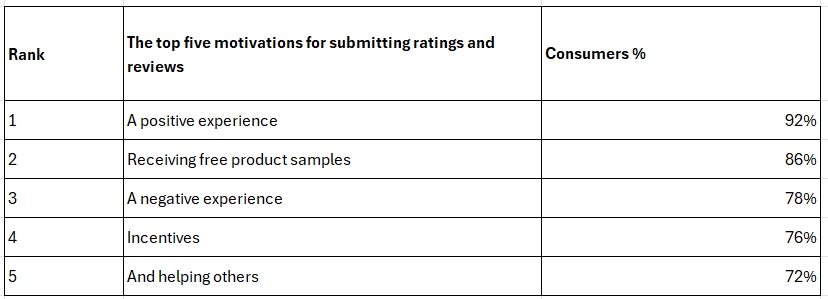As a new law is set to add fake reviews to a list of banned business practices, experts have revealed what motivates genuine customer reviews and how businesses can encourage them to bolster their customer base.
Government figures show that 90% of consumers rely on reviews to make informed decisions about a product or service, yet last year Trustpilot removed a staggering 3.3 million fake reviews.
This new law banning fake reviews is expected to be a significant step towards making shopping more transparent and will mean that genuine customer reviews will become even more important for businesses.
So, why do customers leave genuine reviews? To find out, the team at money.co.uk business insurance has analysed survey and review data to reveal the true motivations.
Top 5 reasons why customers leave reviews:

*based on a survey of 9,286 US consumers.
92% of the consumers surveyed said they had a positive experience with the company’s product or service. This was their most significant motivation for leaving feedback. This could be because positive experiences are more likely to stand out to customers, making them more likely to leave reviews to express gratitude.
Negative experiences can often motivate customers to leave feedback, and the survey data shows that this is one of the top reasons consumers are prompted to submit ratings and reviews (78%). This could be because reviewers want to help others by warning them about the potential pitfalls of using a product or dealing with a company.
Dr Rebekah Wanic, a mindset psychologist, university lecturer and self-optimisation coach at Vent to Reinvent, explains why some customers leave reviews after a negative experience:
“One factor is negativity bias, where we find negative experiences more impactful and negative emotions, such as anger, are often activating. Because we prefer the positive experience, negative emotions often prompt action to make change. A negative review can be a means of publicly holding a business accountable.
“Furthermore, a negative experience violates our expectation that we will get what we paid for, such as a good service or experience. So, sharing the information may be useful to both other customers, as a way to help them avoid the same, and also a way for businesses or service providers to learn where they can make improvements.”
Kyle Eaton, money.co.uk business insurance expert, offers insight into how businesses can encourage online reviews:
-
Ask at the right time: “Prompt customers to leave a review after interacting with your business. This could be a few days after purchasing a product or immediately after a customer support call. This means the experience is fresh in the customer’s mind, leading to more honest feedback. To implement this, identify the best times to ask for reviews based on the nature of your product or service and the customer journey.
-
Keep it simple: “Make sure your customers know the easiest ways to review your business. This could be implemented by providing direct links to review sites on your website or promotional emails. You could also have a step-by-step guide on how customers can leave reviews to simplify the process.
-
Offer rewards: “Incentivise reviewers by offering a small reward like a discount on their next purchase in exchange for a review. Apply this by choosing an appropriate incentive and being transparent to customers that the incentive isn’t just for positive reviews. Review platforms have strict rules on offering review incentives, so familiarise yourself with their policies. This will avoid damage to your business’s reputation.
-
Use social media: “Leverage social media platforms to encourage customers to leave reviews. You could run campaigns encouraging reviews and share positive reviews on your social media channels. Include a call to action in your social media posts to let reviewers share their experiences.
-
Respond to reviews: “Whether the review is positive or negative, always acknowledge each review. Thank customers for their feedback, and address each issue raised. You should also publicly engage with any feedback to build trust and encourage more reviews. Implement this by setting up alerts for new reviews so you can respond as quickly as possible.”

